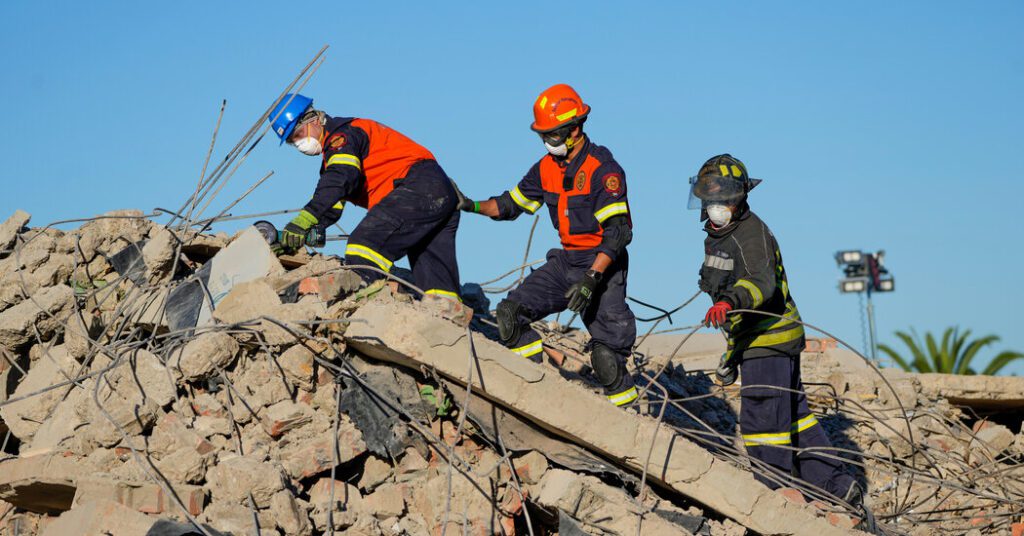It may not have been his dream, but Gift Kasonda was happy working as a laborer on a construction site in the coastal town of George, South Africa. A recent high school graduate, he had immigrated from Malawi last year and hoped to save money for college, said his uncle, Gratium Miska.
Now his family is wondering if those hopes were dashed. The under-construction four-storey building where he worked collapsed in a thunderous moment on Monday, killing at least eight people and leaving dozens of others, including Mr Kasoda, missing.
As the search for survivors passed the 72-hour mark on Thursday, cries for help from beneath the rubble that gave signs of life in the early hours of the collapse died down. But rescuers were still desperately combing through some 3,000 tonnes of concrete. As of Thursday afternoon, 29 of the 37 people pulled from the wreckage had survived and 44 people were still missing, authorities said.
Investigators have just begun the work of trying to figure out what caused the building to fall. For now, many relatives of the missing, like Mr Msiska, are focused on a race against time to find survivors — enduring sleepless nights and just praying for the best.
Mr Msiska said his nephew, who is 18 or 19, arrived in South Africa last October, settled in the same township just outside George where he has lived since 2019, when Mr Msiska himself came from Malawi in search of economic opportunities. .
“You know, life back home, it’s very difficult,” Mr. Msiska said by phone. “He was trying to survive. He is still a young boy, still chasing his dreams. We were all happy.”
On his way home from work on Monday, Mr Msiska said, he got a call from his sister, who was crying so hard she couldn’t understand what she was saying. He was able to tell from someone else that the building where his nephew worked had collapsed.
He said he rushed to the scene, where he found his sister inconsolable. Many other relatives of workers who were in the building were also there, being prayed for and comforted by social workers.
Mr Msiska said he was shocked at the sight of the building: piles of concrete fell to the ground.
“I couldn’t believe there would be any people alive,” he said.
But there was hope in those early hours. The rescuers heard noises below the surface and managed to locate the victims. Some of the trapped workers were able to call loved ones and the authorities. Slowly, people were pulled from the rubble – alive.
A day after the collapse, Vuyokazi Fuba received a phone call that ended a terrifying and tearful 24 hours: It was her brother, 32-year-old Lunga Sindelo, calling from the hospital to say he had survived the collapse.
She ran to see him, she said. He was physically unharmed, she said, but mentally he was struggling. He was very quiet and still looked scared.
Mrs Fuba said he told her he had heard a noise and then the building started to shake. The next thing he knew, all the concrete had collapsed around him and he was in the dark crying. A person died in front of him, Ms Fuba said he told her.
“I’m not good,” she remembers her brother saying. He has since gone to Cape Town, where his other sister lives, to get counselling, Ms Fuba said.
George, with a population of nearly 300,000, sits in the shadow of the Outeniqua mountain range, along the Indian Ocean. It is part of the Garden Route, a scenic route that attracts many tourists.
The collapsed building was intended to house two-bedroom apartments that sold for about 1.7 million rand each (about $92,000). according to local media reports. It was scheduled to open in August.
Rescue efforts at the site over the past three days have been complicated by the instability of huge amounts of concrete piled up around a lift shaft in a volcano-like mound, according to Colin Deiner, the head of disaster management for Western Cape Province who is leading of the rescue operation. He said demolition equipment was brought to the site Thursday to help remove the concrete.
Mr Deiner said there were about 200 people in the search party. They were using seismic equipment and sniffer dogs to try to locate the victims, he said, but were no longer picking up any sound under the rubble. On Monday, they spoke to a stranded worker who called from his cell phone, but have not yet been able to locate him, Mr. Diener said.
Although by international standards the effort should transition from rescue to recovery mode after three days, Mr. Diener said, he was optimistic that some of the victims could survive longer.
In the meantime, Mr Msiska said, he has been receiving many calls from relatives in Malawi.
“Everyone is waiting for the good news,” he said. “And now, I’m tired of answering calls from home because I have nothing to explain.”
However, Mr Msiska said, he remains optimistic that good news will come.
“We still have hope,” he said, “and we trust in God.”


